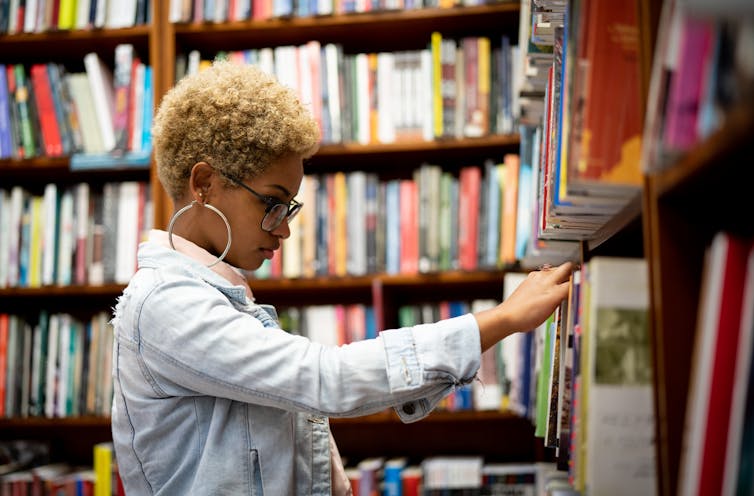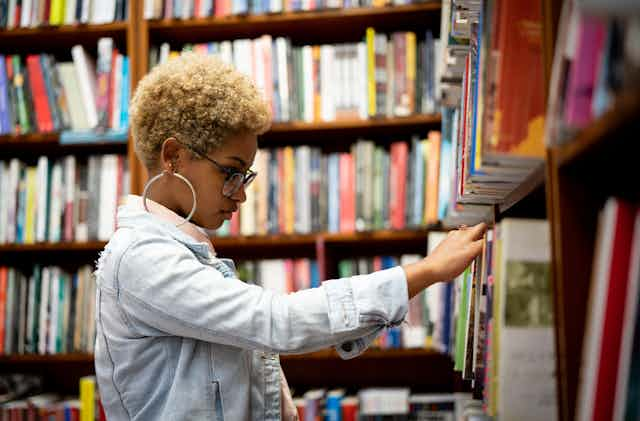
Should we worry, as massive book-banning efforts imply, that young people will be harmed by certain kinds of books? For over a decade and through hundreds of interviews, my colleague, literacy professor Peter Johnston, and I have studied how adolescents experience reading when they have unfettered access to young adult literature. Our findings suggest that many are helped rather than harmed by such reading.
For one study, we spent a year in a public middle school in a small, mid-Atlantic town, observing and talking to eighth-grade students whose teachers, rather than assigning the “classics” or traditional academic texts, let students choose what to read and gave them time to read daily in class. To support student engagement, they made available hundreds of contemporary books that are relevant to the students’ lives. The books included many of the titles currently being challenged, according to PEN America, which is a nonprofit that advocates against censorship, among other things. The titles include Ellen Hopkins’ “Identical,” Jay Asher’s “Thirteen Reasons Why,” Patricia McCormick’s “Sold,” and others that were banned because of themes of sex and violence.
We were interested in what the students perceived to be the consequences of reading young adult literature. They tended to read books they described as “disturbing.” At the end of the school year, we interviewed 71 of the students about changes in their reading and relationships with peers and family.
We also asked open-ended questions about how, if at all, they had changed as people since the beginning of the year. Beyond reading substantially more than they had previously, they reported positive changes in their social, emotional and intellectual lives that they attributed to reading, the kinds of books they read and the conversations those books provoked.
Here are six ways students told us they had been changed by reading and talking about edgy young adult books.
1. They became more empathetic
The students chose mostly fiction, with characters whose life circumstances in many cases differed from their own, including those associated with race, gender, sexuality, culture, language, mental health and household income. Because fiction provides windows into the minds of others, it has the potential to improve empathy, which becomes more probable when readers get emotionally involved in stories.
This is consistent with what the students reported. As one student explained after reading a book about a bullied character, “Like when you see people … you think, well, they don’t have problems or whatever, but then some of the ones I’ve read, you can just understand people better.”
2. They improved relationships
The books contained stark realities about humanity. For instance, some books dealt with how children and teens might be exploited by adults or how mental illness might radically affect a person’s behaviour.
Students shared that as they read, they were encountering some of this information for the first time. Their initial instinct, they said, was to find someone else who had read the book and talk about it.
Consequently, students who rarely talked to each other came together over books. In the process, they learned about each other, became friends or at least developed greater appreciation for each other. They also talked to family members, including parents, some of whom they convinced to read the books.
Relationships in books made teens rethink their own relationships. “Her mom was all rude to her,” one student recalled about a character. “It kind of had me feeling bad, ‘cause I was rude to my aunt, and my situation could have been worse.”
Students shared that reading about characters in dire circumstances changed how they thought about their own families. For instance, several admitted that reading a book about a girl their age who was abducted and abused by an adult male made them more likely to listen to their parents’ advice about safety. Others reading that same book reported becoming more protective of siblings.
3. They became more thoughtful
Reading about the decisions characters made gave the teens a chance to see the potential consequences of their own future choices.
Some described positive characters as role models. Others described using characters who made questionable decisions as cautionary tales and tools of self-reflection.
Statements such as one student’s comment that “I have changed because I think more about things before I do them” were common and were related to problems teens were already facing or could see on the horizon. These problems included toxic relationships, substance abuse, gang-related activity and risky sexual behaviours.
4. They were happier
Even though many students chose books with serious and unsettling content, students claimed reading made them feel better.

Some explicitly attested to the pleasure of reading. “It’s the happiest I’ll get,” one student stated about the time she spent with the books.
More frequently, students described how mental trips through books helped them reconsider their own worries compared with characters with much harder lives.
“You do get an appreciation for what you do have, and, like, for being thankful for the happiness and joy in your life,” one explained. “Some of those books, it’s crazy what’s in there.”
5. Books helped students heal
Some students reported that books helped them heal from depression and grief.
“When I was younger, I lost my best friend,” one student shared after reading about a character whose mother died. “It was really hard for me, but books like that really take me back and help me remember her but without getting really upset.”
Many pointed to the good feelings they got from meaningful book conversations with peers. That is not surprising given the link between positive social relationships and young people’s happiness.
6. They became better readers
Some of the books were difficult for students to read, but they persisted even though they had to work harder to understand them. Other research has found that this persistence is related to the interest that students had in the subjects of the books.
Students reported rereading large chunks of books or even entire books to clear up confusion about storylines, and asking teachers and peers for help with problems such as unfamiliar vocabulary. Their scores on end-of-year reading tests improved, whereas scores for other students remained flat. That is not surprising, since the students in our study read so much. Also, they read mainly fiction, which is correlated with better reading skills compared with other genres.
Students said they started visiting public libraries and bookstores. Declarations like “I’m a bookworm now” suggested they began viewing themselves as readers. They also reported larger changes. “I think I got smarter,” one student remarked.
The positive transformations reported by students we interviewed cannot be generalized, but experimentally controlled studies yield related findings. For instance, adolescents who read and talk to each other about stories with social themes report greater motivation to read, greater use of reading strategies, such as rereading what they don’t understand, and insight into human nature than those who do not.
Our research left us reflecting on why we want young people to read in the first place. Do we want them to reap the social, emotional, moral and academic benefits that reading confers? If so, preserving their access to relevant books – even the “disturbing” ones – matters a lot.
***
Gay Ivey, Professor of Literacy, University of North Carolina – Greensboro
This article is republished from The Conversation under a Creative Commons license.





